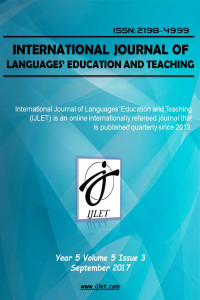An Intercultural Investigation of Meta-Discourse Features in Research Articles by American and Turkish Academic Writers
Öz
This corpus-based study compares the use of hedges and boosters in English academic research articles by Turkish and American academic writers. The data come from 40 research articles collected from well-known international journals of Applied Linguistics. Quantitative and textual analyses reveal that the American academic writers preferred to be visible in their texts by employing a lot more hedges and boosters, while Turkish academic writers opted to be invisible, preferring their studies to speak for themselves. Our results indicate, among other things, the influence of rhetorical practices, and epistemological beliefs, and the cultural, linguistic, and educational backgrounds of academic writers on their use of hedges and boosters. The findings of the study are discussed in relation to these aspects.
Anahtar Kelimeler
Academic writing Research article Metadiscourse Hedge Booster
Kaynakça
- Abdi, R. (2002). Interpersonal metadiscourse: An indicator of interaction and identity. Discourse Studies 4:139-145. https://doi.org/10.1177/14614456020040020101
- Abdi, R, Rizi & M. T., Tavakoli M. (2010). The cooperative principle in discourse communities and genres: a framework for the use of metadiscourse. Journal of Pragmatics, 42: 1669–1679.
- Ädel, A. (2006). Metadiscourse in L1 and L2 English. John Benjamins, Amsterdam.
- Akbas, E. (2012a). Exploring metadiscourse in Master’s dissertation abstracts: Cultural and linguistic variations across postgraduate writers. International Journal of Applied Linguistics & English Literature, 1, 1: 12-26.
- Akbas, E. (2012b). Interactional Metadiscourse in Turkish Postgraduates’ academic texts: A comparative study of how they introduce and conclude. Journal on English Language Teaching 2, 3, pp.35-45.
- Akbas, E. (2014). Are they discussing in the same way? Interactional metadiscourse in Turkish writers’ texts. In Andrzej Łyda &Krystyna Warchał (Eds.) Occupying niches: Interculturality, cross-culturality and aculturality in academic research, (pp 119-134), Springer.
- Algı, S. (2012). Hedges and boosters in l1 and l2 argumentative paragraphs: implications for teaching l2 academic writing. MA thesis, METU, Ankara. (Retrieved from https://etd.lib.metu.edu.tr/upload/12614579/index.pdf)
- Bal-Gezegin, B. (2016). A Corpus-based Investigation of Metadiscourse in Academic Book Reviews. Procedia -Social and Behavioral Sciences 232, 713 – 718.
- Bazerman, C. (1988) Shaping Written Knowledge: The Genre and Activity of the Experimental Article in Science. University of Wisconsin Press, Madison, WI.
- Bizzell, P. (1992). Academic discourse and critical consciousness. Pittsburgh: University of Pittsburgh Press.
An Intercultural Investigation of Meta-Discourse Features in Research Articles by American and Turkish Academic Writers
Öz
Anahtar Kelimeler
Academic writing Research article Metadiscourse Hedge Booster
Kaynakça
- Abdi, R. (2002). Interpersonal metadiscourse: An indicator of interaction and identity. Discourse Studies 4:139-145. https://doi.org/10.1177/14614456020040020101
- Abdi, R, Rizi & M. T., Tavakoli M. (2010). The cooperative principle in discourse communities and genres: a framework for the use of metadiscourse. Journal of Pragmatics, 42: 1669–1679.
- Ädel, A. (2006). Metadiscourse in L1 and L2 English. John Benjamins, Amsterdam.
- Akbas, E. (2012a). Exploring metadiscourse in Master’s dissertation abstracts: Cultural and linguistic variations across postgraduate writers. International Journal of Applied Linguistics & English Literature, 1, 1: 12-26.
- Akbas, E. (2012b). Interactional Metadiscourse in Turkish Postgraduates’ academic texts: A comparative study of how they introduce and conclude. Journal on English Language Teaching 2, 3, pp.35-45.
- Akbas, E. (2014). Are they discussing in the same way? Interactional metadiscourse in Turkish writers’ texts. In Andrzej Łyda &Krystyna Warchał (Eds.) Occupying niches: Interculturality, cross-culturality and aculturality in academic research, (pp 119-134), Springer.
- Algı, S. (2012). Hedges and boosters in l1 and l2 argumentative paragraphs: implications for teaching l2 academic writing. MA thesis, METU, Ankara. (Retrieved from https://etd.lib.metu.edu.tr/upload/12614579/index.pdf)
- Bal-Gezegin, B. (2016). A Corpus-based Investigation of Metadiscourse in Academic Book Reviews. Procedia -Social and Behavioral Sciences 232, 713 – 718.
- Bazerman, C. (1988) Shaping Written Knowledge: The Genre and Activity of the Experimental Article in Science. University of Wisconsin Press, Madison, WI.
- Bizzell, P. (1992). Academic discourse and critical consciousness. Pittsburgh: University of Pittsburgh Press.
Ayrıntılar
| Birincil Dil | İngilizce |
|---|---|
| Konular | Dil Çalışmaları (Diğer), Uygulamalı Dilbilim ve Eğitim Dilbilimi |
| Bölüm | Araştırma Makalesi |
| Yazarlar | |
| Yayımlanma Tarihi | 30 Eylül 2017 |
| Yayımlandığı Sayı | Yıl 2017 Cilt: 5 Sayı: 3 |


